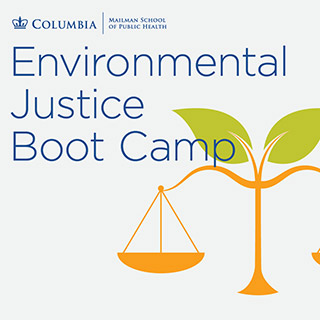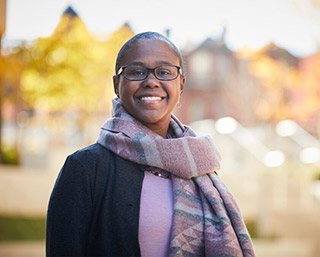April 18, 2022

Scientists from across the U.S. are taking a deep dive into environmental justice research thanks to a series of short, intensive courses focused on uncovering the roots of environmental health disparities and highlighting real-world solutions. The “boot camps” are jointly hosted by the NIEHS-funded Environmental Health Sciences Core Centers at Harvard University, Columbia University, and the University of California, San Francisco (UCSF).
“Much of environmental health disparities research is descriptive — documenting disparities based on things like social or geographic factors — but at some point, it’s important to stop documenting and start doing,” said Tamarra James-Todd, Ph.D., associate professor of environmental reproductive epidemiology at Harvard University, who organizes and co-directs the two-day boot camps along with Joan Casey, Ph.D., of Columbia University.
Taught by experts in environmental health, sociology, epidemiology, health policy, community engagement, and biostatistics, the courses cover how to design studies that effectively evaluate environmental health disparities and how to maximize the impact of the research.
“Training opportunities like these boot camps help to inspire students early in their research careers to start thinking about how to move research into action,” said Lindsey Martin, Ph.D., a health scientist administrator in the NIEHS Population Health Branch. Martin spoke about the role of implementation science in environmental justice research during the January 2022 course.
Melissa Smarr, Ph.D., a health scientist administrator in the NIEHS Population Health Branch, served as a as a panelist at the August 2021 session.
“I was thrilled to have the opportunity to speak with the attendees about funding opportunities and future directions in the field of environmental justice,” said Smarr. “Initiatives like these boot camps are essential to shift the research in this space toward achieving and sustaining environmental health equity and environmental justice.”
Courses In High Demand

According to James-Todd, demand is high for training in environmental justice research. Both the August 2021 and January 2022 sessions were full, with an overflow list of students waiting to take the course.
“Our students are very thirsty for this,” she said.
James-Todd noted that the collaboration among the Harvard, Columbia, and UCSF Core Centers has allowed for a greater number of trainees to attend. Additionally, each Center is providing scholarships to help trainees cover the cost of registration.
The next Environmental Justice Boot Camp will be held August 15-16, 2022. Registration is now open.
(This story is based on a November 2021 news feature from the Harvard T.H. Chan School of Public Health.)


